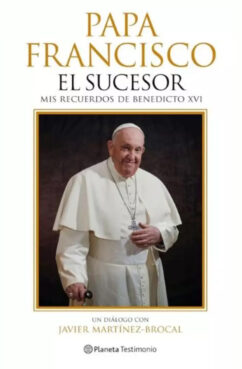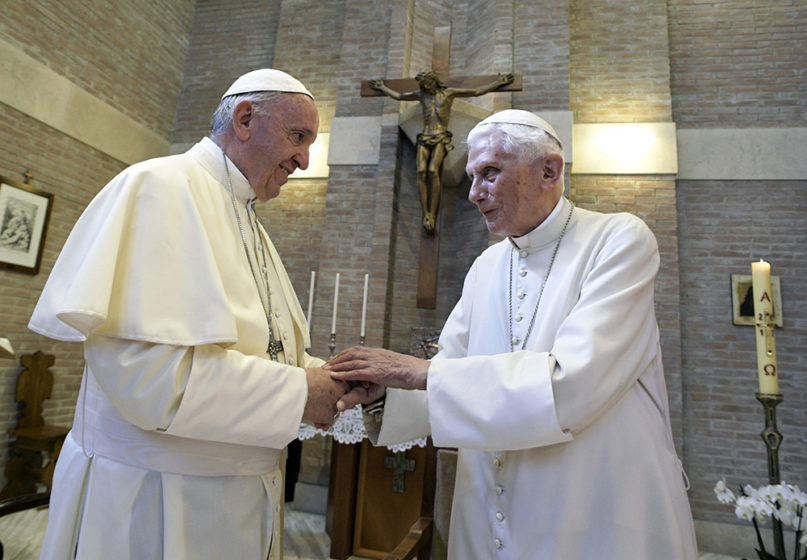VATICAN CITY (RNS) — Pope Francis said in a newly released interview that he backed his predecessor, Pope Benedict XVI, at the conclave that elected Benedict pope in 2005, despite the efforts of some cardinals to hijack the election.
“In that conclave — the information is known — they used me,” Francis said.
The pope’s comments were made to the Vatican journalist Javier Martinez Brocal, who writes for the Spanish publication ABC, and will appear in a new book called “The Successor” to be published in Spain on Wednesday (April 3). An excerpt of the interview was published by ABC on Sunday.
The book focuses on the relationship between Francis and Benedict, who shocked the world in 2013 when he announced his decision to step down as pontiff and take the title of emeritus pope. For nine years, until Benedict’s death in 2022, Francis navigated the unusual and not always comfortable situation of not being the only pope living inside the Vatican.

“The Successor: My Memories of Benedict XVI” (Courtesy image)
At the 2005 conclave, Francis was already being considered as a possible candidate for the papacy. But according to Francis, some cardinals who opposed Benedict lobbied for votes for Francis, hoping to prevent the then-Cardinal Joseph Ratzinger from receiving the two-thirds majority of votes necessary to become pope.
The cardinals never intended for Francis to win the election instead of Benedict; rather, the strategy was aimed at making way for a third, compromise candidate.
“The idea was to block the election of Cardinal Joseph Ratzinger,” Francis explained. “They were using me, but in the meantime, they were already thinking about proposing another cardinal. They had not yet agreed on who, but they were ready to throw out a name.”
Francis said that those who pretended to back him stated that “they did not want a ‘foreign’ pope,” given that Pope John Paul II, who ruled over the church from 1978 to 2005, was Polish. Most popes in the Vatican’s history have been Italian.
“The cardinals swear not to reveal what happens in the conclave, but the popes have permission to tell it,” Francis clarified.
In the book, Francis said he warned the cardinals who were backing him to not “fool around” with his candidacy, adding that he would not accept the role of pontiff were the scheme to backfire and actually gain him sufficient votes. He told the interviewers that Benedict was his candidate because, after the charismatic papacy of John Paul II, the church needed someone “who maintained a healthy balance, a transitional pope.”
Francis added that he was glad he was not elected in 2005 because he would not have been able to make “a lot of trouble,” apparently referring to the strong opposition he has encountered in making reforms in the Vatican during his own papacy. He left the first reforms to Benedict, who had the goodwill of being John Paul’s lieutenant for much of his papacy.
Even so, Francis said, reform was not accepted at first. “Benedict XVI was a man who led to the new style. And it wasn’t easy for him, huh? He encountered a lot of resistance within the Vatican,” he said.
Francis underlined that Benedict’s election in 2005 showed that the Holy Spirit decides who is elected pope, and there is not space to rig the conclave.
Since his election as pope in 2013, Francis has created one of the most culturally and ethnically diverse batches of cardinals in Catholic history, assigning red hats to places that are far removed from traditional centers of power in the church.





